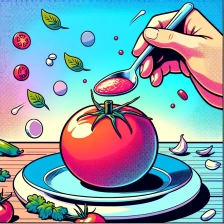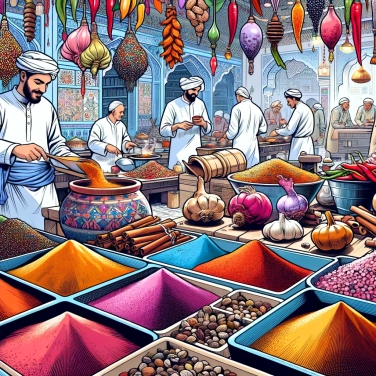In detail, for those interested!
Why are spices used in cooking?
Spices have been used in cooking for millennia. They add flavor, aroma, and color to dishes. Spices were also used to preserve food before the invention of refrigeration. They can transform a simple dish into a complex and delicious taste experience. Different cultures use spices to create unique and distinctive traditional dishes. In addition to their use in cooking, some spices also have medicinal properties and can help improve health. In summary, spices are essential in cooking for their ability to enhance the taste of dishes and add diversity to recipes.
The influence of spices on the flavor of dishes
Spices play a crucial role in influencing the flavor of dishes. They bring a variety of sensory qualities that enrich the taste experiences. Spices can add depth, heat, freshness, bitterness, acidity, or even sweetness to dishes. Some spices like pepper, cinnamon, cloves, or chili, have distinct flavor profiles that can transform an ordinary dish into a memorable culinary creation.
In addition to their distinctive aroma, spices can also enhance the texture of dishes. For example, ground cardamom can add a fine, granular texture to a curry, while saffron can bring a touch of silky sweetness to a risotto. By combining different spices, chefs can create complex and balanced flavor profiles that appeal to the taste buds and leave a lasting impression.
The judicious use of spices can also transform a bland dish into an exciting culinary experience. Spices have the power to enhance the natural flavors of ingredients, adding nuances and contrasts that awaken the senses. For example, a pinch of cumin can intensify the flavor of lamb in a tagine, or fresh ginger can balance the sweetness of carrots in a soup.
In summary, spices are essential ingredients that can transform an ordinary dish into a culinary masterpiece. Their influence on the flavor of dishes is undeniable, and the art of using them judiciously can enrich our taste experiences in unparalleled ways.
The beneficial properties of spices for health
Spices are not only used to enhance the flavor of dishes, they also possess beneficial properties for health. Indeed, many spices are rich in bioactive compounds with antioxidant, anti-inflammatory, antibacterial, and antifungal properties. For example, turmeric contains curcumin, a powerful antioxidant that can help reduce inflammation and protect cells from damage by free radicals.
Ginger is another example of a spice with multiple health benefits. It is known for its anti-nausea, anti-inflammatory, and antioxidant properties. Ginger is often used to relieve nausea and stomachaches, and some studies suggest it may also help reduce joint pain in people with arthritis.
Cumin, on the other hand, is a spice rich in nutrients such as iron, calcium, and magnesium. It is also associated with various health benefits, including promoting digestion, reducing bloating, and regulating blood sugar levels.
Other spices like cinnamon, cloves, cayenne pepper, and black pepper have also shown positive effects on health, ranging from regulating blood sugar to boosting metabolism and protecting against cardiovascular diseases.
By incorporating a variety of spices into our daily diet, we can not only enhance the taste of our dishes, but also enjoy their many health benefits.
Spices and their cultural importance in certain culinary traditions
Spices have played a major role in many culinary traditions around the world. Their use dates back thousands of years and has helped shape the culinary identity of many cultures.
In many societies, spices are used not only to enhance the flavor of dishes, but also to symbolize important cultural and social elements. For example, some spices were considered symbols of wealth and social status, and were reserved for special occasions or distinguished guests.
Spices have also played a significant role in trade between different regions of the world. Throughout history, many spices have been considered valuable commodities and have been used as currency in international trade. These exchanges have helped spread culinary traditions and enrich cuisines worldwide.
In some cultures, the use of spices is associated with rituals and religious traditions. For example, some spices were used in offerings made during religious or ritual ceremonies, symbolizing the connection between man and the divine through food.
Finally, spices are often associated with stories and legends that have been passed down from generation to generation. These narratives help strengthen the bond between people, food, and their cultural heritage, making spices an essential element of the culinary identity of many traditions around the world.
![Explain why some countries change time zones?]()
![Explain why chilling the butter before working it into puff pastry dough ensures a better texture.]()
![Explain why Alexander the Great refused to wear shoes.]()
![Explain why Alexander the Great always wore an impressive helmet.]()




















